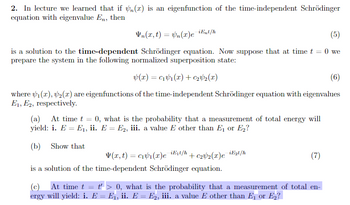Question
i only need help with 2 c

Transcribed Image Text:2. In lecture we learned that if (r) is an eigenfunction of the time-independent Schrödinger
equation with eigenvalue En, then
Vn(x, t) = n(r)e iEnt/h
(5)
is a solution to the time-dependent Schrödinger equation. Now suppose that at time t = 0 we
prepare the system in the following normalized superposition state:
y(x) = c₁₁(x) + €₂₂(x)
(6)
where ₁(x), ₂(x) are eigenfunctions of the time-independent Schrödinger equation with eigenvalues
E₁, E2, respectively.
(a) At time t = 0, what is the probability that a measurement of total energy will
yield: i. E = E₁, ii. E = E₂, iii. a value E other than E₁ or E₂?
(b)
Show that
iExt/h
V(x, t) = c₁v₁(r)e
+ €2V/2(x) e
is a solution of the time-dependent Schrödinger equation.
iE₂t/h
(7)
(c) At time t = t'> 0, what is the probability that a measurement of total en-
ergy will yield: i. E = E₁, ii. E = E2, iii. a value E other than E₁ or E₂?
Expert Solution
This question has been solved!
Explore an expertly crafted, step-by-step solution for a thorough understanding of key concepts.
This is a popular solution
Trending nowThis is a popular solution!
Step by stepSolved in 3 steps with 2 images

Follow-up Questions
Read through expert solutions to related follow-up questions below.
Follow-up Question
Thats for question a when t=0. Is it the same when t=t' in question c?
Solution
by Bartleby Expert
Follow-up Questions
Read through expert solutions to related follow-up questions below.
Follow-up Question
Thats for question a when t=0. Is it the same when t=t' in question c?
Solution
by Bartleby Expert
Knowledge Booster
Similar questions
- A mass, m, with speed, v, undergoes a perfectly elastic collision with an initially stationary I mass, M, as shown in the picture. What is the ratio of the two masses, m/M if after the collision, m and M have the same speed, V, but opposite velocities?arrow_forwardI am unsure of how to solve this problem. Any help would be greatly appreciated. Thank you.arrow_forwardPlease provide typed answer. I NEED TYPED ANSWERS. Thank you.arrow_forward
arrow_back_ios
arrow_forward_ios